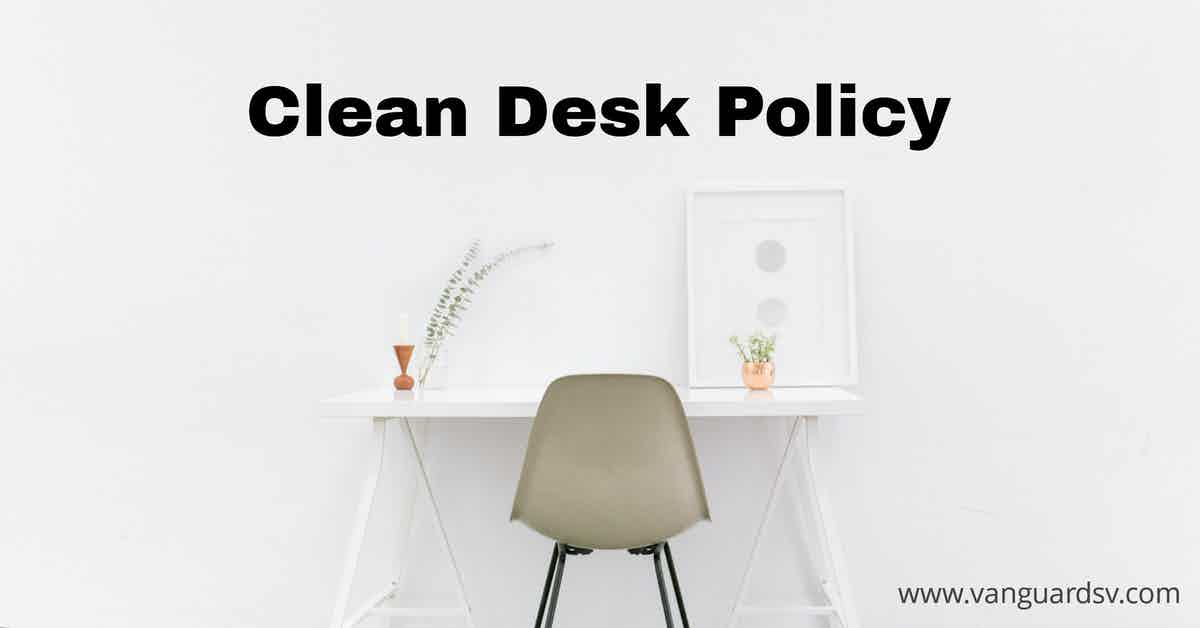March is the start of spring cleaning and is the ideal time to implement clean desk policies that aid in workplace safety, security, and hygiene while eliminating clutter and unhealthy distractions.

Why Your Business Should Implement a Clean Desk Policy
Clean desk policies provide several benefits to facility occupants and organizations, including:
- Reduced occupant stress and improved focus.
- Improved security and HIPAA compliance.
- Increased occupant productivity.
- Decreased operational costs, and;
- Better cleaning and infection prevention and control outcomes.
According to a recent article published by the Harvard Business Review;
[Research] has shown that our physical environments significantly influence our cognition, emotions, and behavior, affecting our decision-making and relationships with others.
Cluttered spaces can have negative effects on our stress and anxiety levels, as well as our ability to focus, our eating choices, and even our sleep.
Much of the research (and much of the public enthusiasm) around tidiness and clutter is currently focused on the home, but with workplace stress costing American businesses up to $190 billion every year in health care costs alone, it’s time to recognize the role that clutter plays in our work lives — and to do something to clean up the mess.
The Impact of Clutter on Work Stress and Productivity
Recent studies have established strong correlations between workplace stress, workloads, office clutter, and occupant performance.
We hypothesized that problems with office clutter might arise when job stressors and strains foster neglect and indecision; consequently, these factors may contribute to growing piles of clutter that potentially impede workers’ effectiveness in close physical environments within which work is performed.
We tested the hypothesis that workload stress relates to increased problems with office clutter through two consecutive mediating steps, specifically via emotional exhaustion that, in turn, leads to decisional procrastination.
Results of our study provide support for our hypothesized model.
The Benefits of a Clean Desk Policy
Besides eliminating clutter to support occupant mental wellbeing and productivity, a clean desk policy also ensures the custodial staff has a clear path to clean the surface.
Desks are notorious for hosting and transmitting germs, with some tests showing they are 400 times more filthy than the average office toilet seat.
The average desk contains 400 times more germs than a toilet seat, new research has revealed.
Visualizations have been released showing how a host of nasties are harboring on desk spaces across the country.
The research revealed that more than two-thirds of office workers are at risk of sickness due to dirty desks.
Failing to clean regularly with antibacterial wipes can encourage dangerous bugs to breed, such as Helicobacter pylori, Staphylococcus aureus, E-coli, and Pseudomonas aeruginosa, to name a few.
The average desktop harbors 20,961 germs per square inch and that’s in addition to 3,295 on the keyboard and 1,676 on a mouse and a staggering 25,127 on the phone.
Average desk contains 400 times more germs than a toilet seat, new research reveals
Clean Desk Environment TIps
Implementing a clean desk environment policy is relatively straightforward and leverages established technologies and practices.
The first step is to eliminate paper clutter as much as possible.
This can be accomplished by:
- Implementing paperless scanning and data storage technologies.
- Warehousing archival documents your organization is required to keep.
- Shredding and recycling unnecessary paper products that are cluttering up the facility, and;
- Identifying specific locations for paper product storage within the facility or individual office spaces, especially sensitive corporate documents.
The next step is to document, communicate, and implement a policy for office staff to clear off their desks, including:
- Any clutter.
- All paperwork and books, and;
- Any item that may deter custodial staff from fully sanitizing the desktop.
The final step is to remove all garbage to a central location appropriate for the material it contains.
For example--regular garbage (paper and food waste) can safely be disposed of in dumpsters, but secure documents should be placed in a shredding bin.
Takeaway
Maintaining a clean, clutter-free desk and workspace is a policy that benefits all facility occupants and should be implemented from the top-down to demonstrate leadership, protect sensitive information, and ensure the highest facility health and hygiene standards.
Clean, clutter-free workspaces do not simply ensure data is not lost or stolen; they help prevent worker illness and stress--an issue costing U.S. businesses hundreds of billions of dollars per year.
Additionally, cooperative cleaning assists custodial staff in providing improved cleaning outcomes that will add to worker wellness and productivity while reducing the spread of infection.
If you would like more information regarding the effectiveness of high-performance infection prevention and control measures, or if you would like to schedule a free, no-obligation onsite assessment of your facility's custodial needs, contact us today for a free quote!
In Bakersfield, CA, call (661) 437-3253
In Fresno, CA, call (559) 206-1059
In Valencia CA, or Santa Clarita CA, call (661) 437-3253
In Palmdale, CA or Lancaster, CA, call (661) 371-4756

